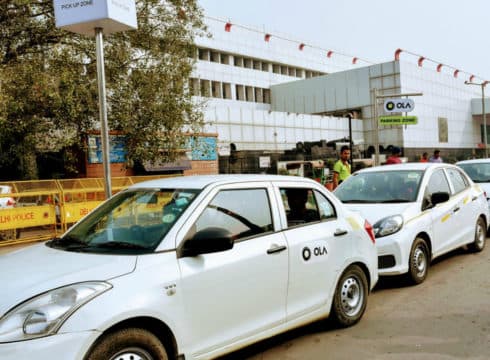Karnataka state transport ministry wing last week served a notice to Ola and for allegedly failing to comply with state cab aggregator laws
Ola and Uber allegedly failed to submit quarterly ridership and driver-related reports which is mandatory under the specific law addressing cab aggregators
Karnataka has a history of excessively regulating the mobility and transport sector for which it has received backlash from both customers and companies alike
Inc42 Daily Brief
Stay Ahead With Daily News & Analysis on India’s Tech & Startup Economy
The Transport Department of Karnataka has intensified its crackdown on cab aggregators at a time when the segment is gradually recovering from the impact of the covid-19 pandemic.
Karnataka state transport ministry wing last week served a notice to Ola and Uber for allegedly failing to comply with the Karnataka On-Demand Transportation Technology Aggregators Rules, which was enacted in 2016.
Multiple media reports on July 24 pointed out that Ola and Uber allegedly failed to submit quarterly ridership and driver-related reports which is mandatory under the specific law addressing cab aggregators.
Hemantha Kumar, Additional Commissioner, Transport Department, told TOI on July 24 that Ola’s license had expired on Jun 19, 2021and that company failed to renew the state-imposed license. “For Uber the licence will expire in December 2021, so they can operate cabs in the city,” Kumar added.
Kumar also confirmed with Inc42 that notices were sent to both Ola and Uber for not complying with various laws mentioned in the On-Demand Transportation Technology Aggregators Rules.
“We are currently investigating Ola for not submitting required documentation work that is required under the law and for failing to renew license. We are not probing Uber on these terms,” Kumar added in a phone interaction with Inc42 on July 26.
Transport Commissioner Kumar also told us that both Ola and Uber do not list a customer care contact on its portal which is required by the law. “This is another point of concern why we are probing both aggregators,” he added.
Ola did not respond to an email seeking comments. However, a source close to the company told Inc42 that Ola did not submit documents for license renewal since the central government had earlier extended the license of all companies and individuals until September 2021 due to the pandemic.
“Ola has been regularly filing documentation and required details under the Karnataka cab aggregators law since 2016. However, we haven’t submitted documentation for last quarter due to constraints bought in by the pandemic,” the source added.
Uber did not respond to an email seeking comments until the publication of this article.
Earlier, the Karnataka Transport Department raided the Bengaluru offices of cab aggregators Ola and Uber India on July 16 and July 17 for non-compliance with Karnataka’s On-Demand Transportation Technology Aggregators Rules. Ola’s office in Koramangala was raided on Friday (July 16), whereas Uber’s Murugeshpalya office was raided on Saturday (July 17).
N Shivakumar, transport commissioner, Karnataka told the media last week that the department has issued a notice to both the companies to comply with the rules and the raid was conducted to verify the quarterly reports.
He also added that they were receiving complaints from drivers about low earnings and so the department wanted to check the fare collected from the passengers and disbursed among drivers.
Karnataka And Haryana States’ Tryst With Urban Mobility
Note that Karnataka state has a history of excessively regulating the mobility and transport sector for which it has received backlash from both customers and companies alike. The state had cracked down on bike-taxis and shuttle services offered by urban mobility startups which have had far-reaching effects on the segment.
In 2019, Karnataka state police had imposed penalties on drivers and confiscated bikes in the absence of a clear-cut policy for bike taxis. The Karnataka transport department had declared Uber and Ola’s bike-sharing services as “illegal” in 2016. However, this changed after the state announced a new policy on July 15 that allowed electric bike taxis to run on the road for a limited distance.
The tussle between the Karnataka government and the ride-hailing companies has been persisting since the launch of Ola and Uber in 2013. In June 2018, the state government had issued a notice to Ola and Uber against violation of rules for charging the time-based fare. This came after the government revised tariff plans for taxis came into effect in January 2018 where the state government had fixed fares by classifying them into different categories.
In 2017, Karnataka’s transport department had given a three-day deadline to both the cab-hailing giants Ola and Uber directing them to stop their cab sharing services by declaring them as illegal.
Apart from cab aggregators, the Karnataka government also heavily cracked down on bus shuttle services such as ZipGo and other similar services offered by Ola in the past. In 2015, Bengaluru-based shuttle bus service, ZipGo, had suspended services several times in the city after the state transport department alleged them of violating rules and operating without permits.
Karnataka effectively cracked down on ZipGo in an effort to maintain its monopoly over bus services offered by Bangalore Metropolitan Transport Corporation (BMTC). While banning ZipGO services in 2015, Ramegowda, Karnataka’s commissioner for transport and road safety said, “They are operating illegally. They have to obtain a permit, a stage carriage permit, but they won’t get it here because it’s the same area as the BMTC. Because of this, they can’t operate.”
Later the Haryana government also cracked down on bus and shuttle aggregators service providers, Shuttl and Ola’s Shuttle in Gurgaon. These crackdowns eventually affected shuttle providers with ZipGo suspending its business operations in April 2019. Later in June 2021, Gurugram-based bus aggregator Shuttl also announced that it is shuttering its business and exploring merger and acquisition opportunities with Indian and international companies, according to cofounder Amit Singh.
{{#name}}{{name}}{{/name}}{{^name}}-{{/name}}
{{#description}}{{description}}...{{/description}}{{^description}}-{{/description}}
Note: We at Inc42 take our ethics very seriously. More information about it can be found here.


